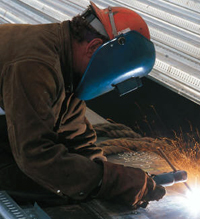Posts Tagged ‘“Boston construction accident lawyers”’
Workplace Accidents Killed 58 Massachusetts Workers in 2011
 Fifty eight workers lost their lives on the job last year in Massachusetts. The average fine in closed investigations into those deaths was less than $7,000.
Fifty eight workers lost their lives on the job last year in Massachusetts. The average fine in closed investigations into those deaths was less than $7,000.
The Massachusetts Coalition for Occupational Safety and Health (MassCOSH) released the figure in its annual report at Workers’ Memorial Day on April 28. In “Dying for Work in Massachusetts,” the group reported firefighters and construction workers again account for the majority of workplace deaths in Massachusetts. The group called for reforms such as strengthening OSHA regulations to prevent construction accidents and passing new state laws to protect temporary workers.
“It is deplorable that so many workers still die or are severely injured in workplace accidents,” said Boston personal injury lawyer David White of Breakstone, White & Gluck. “Employers must be held accountable when they fail to follow safety requirements and cause injuries or deaths.”
Breakstone, White & Gluck is a proud sponsor of MassCOSH, an organization with a great reputation for protecting workers and improving workplace safety.
In 2011 in Massachusetts, the average fine in the death of a worker was $6,490. MassCOSH said this low cost encourages employers to disregard OSHA regulations.
The group noted there is no consistent trend in the number of worker deaths. But in 2011, the number of workers lives’ lost rose 11, up from 47 in 2010.
Thirteen firefighters died in 2011, two as the result of injuries sustained while responding to fires. Another firefighter was crushed while performing routine vehicle maintenance. Ten others died due to work-related cancer and heart disease.
Construction accidents accounted for eight wrongful deaths. Deaths were also reported in the human services and commercial fishing industries.
MassCOSH reports workers are dying in four ways: motor vehicle accidents and incidents; construction falls; workplace violence and drowning. Falls from ladders, roofs and trees accounted for 20 percent of all workplace deaths. Construction accidents were involved in 14 percent of workplace deaths, including three men who were killed in electrocutions and explosions.
MassCOSH Reforms
The advocacy organization for workers’ rights is calling on state and federal lawmakers to make a number of changes. These include:
Proposed Changes at the Federal Level:
- Strengthen OSHA regulations, with one measure including criminal prosecution.
- Overhaul OSHA’s system for regulating toxic chemicals.
- Better protect immigrant workers by increasing the number of bilingual investigators.
- Improve whistleblower protections.
Proposed Changes at the State Level:
- Full implementation of Executive Order 511, so all state agencies have committees which ensure national health and safety standards are being met.
- Make improvements to Massachusetts workers’ compensation laws so coverage is provided to all injured workers.
- Pass the “Temporary Worker Right to Know Law,” which would increase state oversight and ensure that temporary workers are provided written notice of job assignments, supervisors, wages and other key details.
Massachusetts Supreme Judicial Court Denies General Contractor Immunity
Ruling Confirms Rights of Injured Workers to Bring Third Party Claims Against General Contractor after Receiving Workers’ Compensation Insurance
The Supreme Judicial Court (SJC) today affirmed the right of an employee of an uninsured subcontractor to bring third party claims against the general contractor, even if the general contractor has made workers’ compensation payments pursuant to G.L. c. 152, § 18. The case was an important victory for workers injured in construction accidents.
The case arose from an explosion on a residential construction site. The explosion killed a worker and seriously injured his son, who was also working at the site. Both men were employed by Great Green Barrier Co., which did not have workers’ compensation insurance. As a result, pursuant to G.L. c. 152, § 18, the general contractor, Henry C. Becker Custom Building Ltd., was liable for the workers’ compensation obligations. This obligation arises under the policy in Massachusetts that a general contractor is responsible to hire only subcontractors which have workers’ compensation insurance available for their employees.
The defendant argued that the statutory scheme prevented the plaintiffs from making third party claims once they had accepted lump sum workers’ compensation settlements pursuant to G.L. c. 152, § 23, which ordinarily bars workers from maintaining negligence claims against their employers if they have accepted workers’ compensation benefits. While this argument had persuaded the trial court, which granted summary judgment for the defendant, the ruling had been overturned by the Appeals Court. Wentworth v. Henry C. Becker Custom Bldg. Ltd, 76 Mass.App.Ct. 507 (2010).
The SJC granted further appellate review and affirmed the Appeals Court ruling, which reversed the summary judgment for the defendant.
Click here for more information on this case.
Read More

